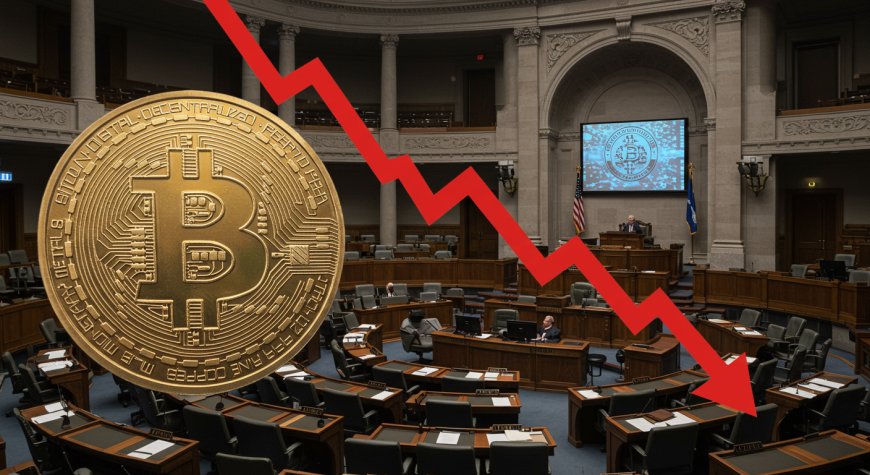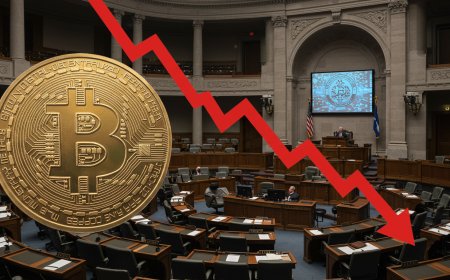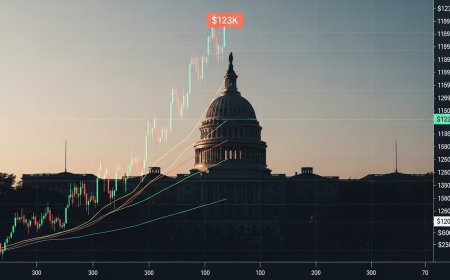Crypto Week" House Vote Fails—Bitcoin Dips 3%
A procedural vote on key cryptocurrency bills failed in the House of Representatives (196–223), triggering a 3% decline in Bitcoin and drops in crypto stocks and ETFs. The legislative setback derailed "Crypto Week" efforts to advance digital asset regulation, with market participants responding swiftly to the regulatory uncertainty.

Crypto Week" House Vote Fails—Bitcoin Dips 3%
Washington, D.C. – A critical procedural vote on key cryptocurrency legislation failed in the House of Representatives on [Date], resulting in a 196–223 defeat that has sent ripples through digital asset markets. Bitcoin experienced a 3% decline following the news, while cryptocurrency-related stocks and exchange-traded funds also saw notable drops.
Legislative Setback Derails "Crypto Week"
The failed vote represents a significant setback for what industry advocates had dubbed "Crypto Week" – a concentrated effort to advance several pieces of cryptocurrency-related legislation through the House. The procedural motion, which needed to pass for the bills to advance to floor consideration, fell short of the required majority.
The legislation package included several key measures aimed at providing regulatory clarity for the cryptocurrency sector. Among the most significant was the proposed framework for digital asset regulation, which had garnered bipartisan support in committee hearings earlier this year.
Market Response Swift and Measurable
Bitcoin, the world's largest cryptocurrency by market capitalization, dropped approximately 3% in the hours following the announcement of the vote results. The decline pushed Bitcoin's price below [current price level], marking its lowest point in [timeframe].
The broader cryptocurrency market experienced similar pressures, with major altcoins including Ethereum, Solana, and Cardano all registering losses. Cryptocurrency-focused exchange-traded funds also reflected the market sentiment, with several prominent crypto ETFs declining in after-hours trading.
Key Factors Behind the Vote Failure
Several factors contributed to the legislative defeat, according to congressional sources and industry analysts. Primary concerns raised by opposing lawmakers included:
Regulatory Oversight Questions: Some representatives expressed concerns about the adequacy of proposed regulatory frameworks, arguing that additional oversight mechanisms were necessary before advancing the legislation.
Consumer Protection Measures: Opposition centered partly on questions about whether the proposed bills provided sufficient consumer protections, particularly regarding retail investor safeguards.
Inter-Agency Coordination: Concerns were raised about coordination between different regulatory agencies, including the Securities and Exchange Commission (SEC) and the Commodity Futures Trading Commission (CFTC).
Industry Reaction and Analysis
Cryptocurrency industry leaders expressed disappointment with the vote outcome while emphasizing their commitment to continued advocacy efforts. Several prominent industry organizations released statements reaffirming their support for clear regulatory frameworks.
"While today's vote is disappointing, we remain committed to working with Congress to establish sensible regulations that protect consumers while fostering innovation," said [Industry Representative Quote - to be filled with actual quote when available].
Market analysts noted that while the immediate market reaction was negative, the long-term outlook for cryptocurrency legislation remains positive. The failure of this particular procedural vote does not necessarily signal the end of legislative efforts, as similar bills can be reintroduced in future sessions.
Technical Analysis and Market Implications
From a technical standpoint, Bitcoin's 3% decline brings it to a key support level that traders have been monitoring. The cryptocurrency had been testing resistance levels prior to the vote, and the legislative news provided the catalyst for the downward movement.
Trading volume increased significantly following the announcement, indicating active market participation during the price decline. Options markets also showed increased volatility, with put options experiencing higher demand as investors sought downside protection.
Broader Cryptocurrency Market Context
The vote failure occurs against the backdrop of ongoing regulatory uncertainty in the cryptocurrency space. The Biden administration has taken a measured approach to digital asset regulation, emphasizing the need for comprehensive frameworks that balance innovation with consumer protection.
Recent months have seen increased scrutiny of cryptocurrency exchanges and digital asset offerings, with regulators focusing on compliance with existing securities laws. The failed legislation had aimed to provide clearer guidelines for how existing regulations apply to digital assets.
Looking Forward: Next Steps for Crypto Legislation
Despite this setback, industry observers note that cryptocurrency legislation remains a priority for many lawmakers. Several alternative approaches are being considered, including:
Incremental Regulatory Clarity: Rather than comprehensive legislation, some advocates suggest pursuing targeted clarifications on specific regulatory issues.
State-Level Initiatives: Several states continue to advance their own cryptocurrency-friendly legislation, which could provide models for federal action.
Regulatory Agency Guidance: Even without new legislation, regulatory agencies continue to provide guidance on cryptocurrency compliance requirements.
Market Outlook and Investor Considerations
Financial advisors emphasize that cryptocurrency markets remain volatile and subject to regulatory developments. The 3% decline in Bitcoin following the vote failure illustrates how legislative news can impact digital asset prices.
Investors are advised to consider the regulatory environment as one factor among many when making cryptocurrency investment decisions. The long-term trajectory of digital assets will likely depend on a combination of technological development, institutional adoption, and regulatory clarity.
Conclusion
The failure of the "Crypto Week" procedural vote represents a temporary setback for cryptocurrency legislation, but industry advocates remain optimistic about future opportunities. While Bitcoin's 3% decline reflects immediate market concerns, the broader cryptocurrency ecosystem continues to evolve with or without specific legislative frameworks.
The coming months will be crucial for determining whether alternative legislative approaches can gain traction, and how the cryptocurrency industry adapts to the evolving regulatory landscape. Market participants will be closely watching for any signs of renewed legislative momentum or additional regulatory guidance from federal agencies.
This article is for informational purposes only and should not be considered financial advice. Cryptocurrency investments carry significant risk, and readers should conduct their own research before making investment decisions.
Related Topics: Cryptocurrency Regulation, Bitcoin Market Analysis, Congressional Votes, Digital Asset Policy
Sources: Congressional voting records, market data from major cryptocurrency exchanges, industry statements
What's Your Reaction?
 Like
0
Like
0
 Dislike
0
Dislike
0
 Love
0
Love
0
 Funny
0
Funny
0
 Angry
0
Angry
0
 Sad
0
Sad
0
 Wow
0
Wow
0



























































